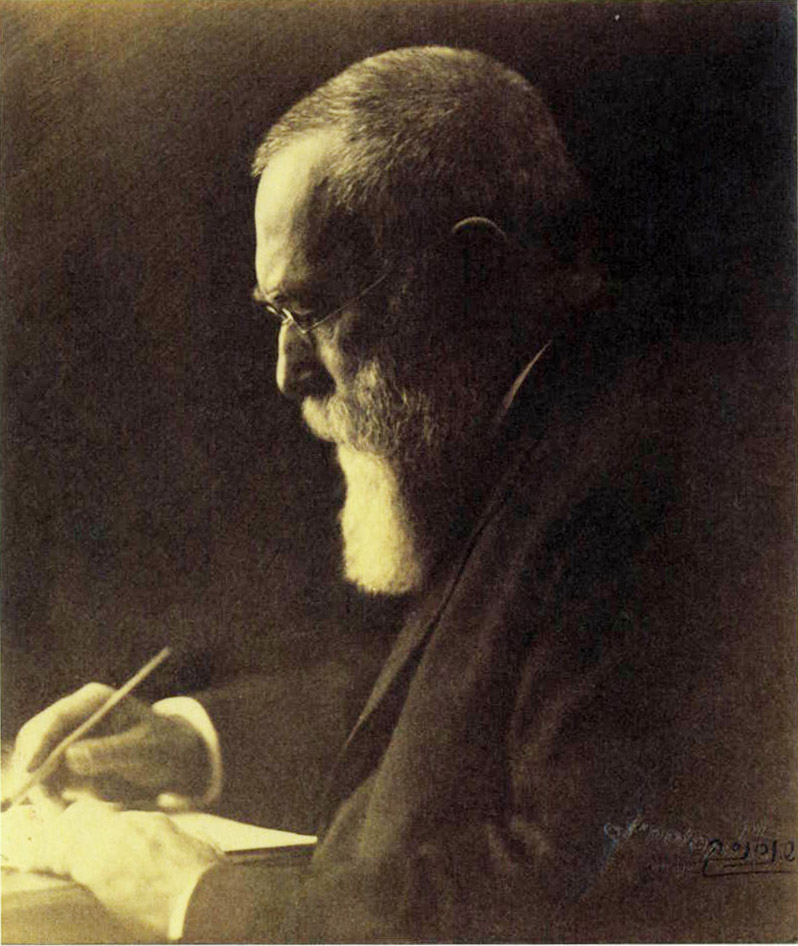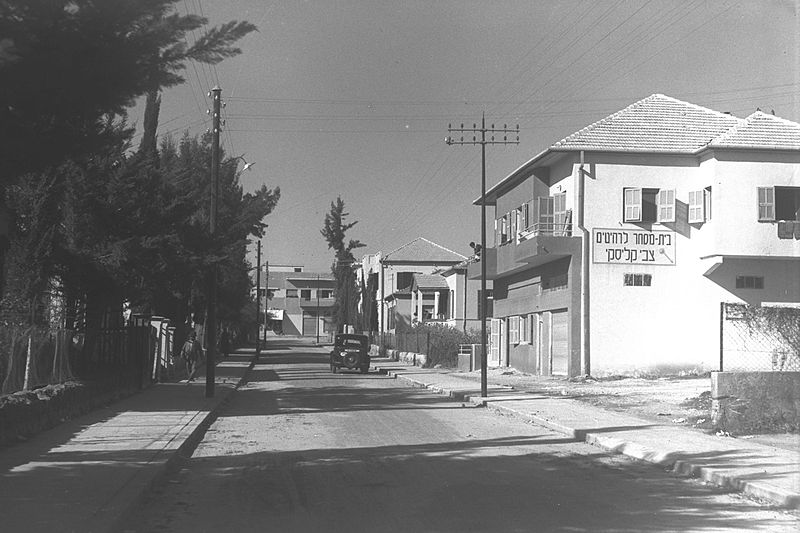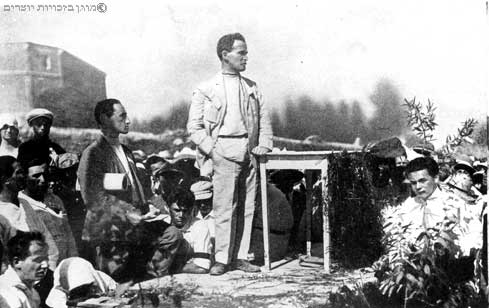A founding father of Zionism takes aim at socialist methods of settlement of the country, calling them nothing more than begging by other means.
Zalman David Levontin (1865-1940) was an Eastern European Hassid and small scale banker who became a Zionist leader and led a group of Jewish colonists to found Rishon Letzion. He later returned to Europe, served as an advisor to Herzl, founded the bank which would become Bank Leumi, and ran the Zionist Bank. Levontin returned to Rishon Letzion in 1903, where he continued his Zionist activity until his death in 1940.
The article below, “Settlement in the Land of Israel: Means and Methods”, is taken from a pamphlet published in 1925. In the article, Levontin discusses the negative consequences of socialist settlements, which came instead of settlements based on free enterprise.

Settlement in the Land of Israel – Means and Methods
I.
Many questions are involved in settling our country; they are all discussed in congresses and meetings… in newspapers and in books. But one question is not discussed at all: what are the moneys, with which one founds settlements and build a country – by capitalist and philanthropic means. We debate a great deal about the expansion or contraction of the Jewish Agency, with arguments both for and against, and all the arguments revolve around a single point: how much money will Jewish Agency members contribute, or how much will come as handouts from the broader public. However, we do not deal with the very question of whether it is possible to build a National Home with philanthropy, or whether perhaps capitalistic means are needed. In my opinion, the question – what are the means with which we can bring about a broad Jewish settlement of our country – is very important, and I would like to express my opinion on this issue. Perhaps others will follow, discuss this question, and this way matters will be clarified.
In the world at large, when one state wants to exploit economic resources of another state or expand its political influence – it establishes banks with large funds, companies for expanding rail networks, coastal construction, industry and so on. Particularly when one comes to settle a country that is unsettled or in poor economic condition – as we know from the history of the past few centuries – one conducts capitalist settlement: you establish a company for settlement, it surveys the country, its yield and the wealth that can be exploited and it conducts its activity based on this investigation. The company is founded with a large commercially-based fund – but the profits are restricted, because in any widespread settlement of an unsettled country, there is also a political motive. If such a company had been founded, according to preliminary investigations done by us, it would be possible, for instance, to drain the Huleh lake north of the Kinneret, in order to arrange plantings of cotton, sugar cane, a papyrus harvest for the paper industry, tobacco and so on. All of these are materials which require processing, and this would undoubtedly lead to the founding of a sugar factory, a paper factory for cigarettes and so on. A rich company could exploit the salt water of the Dead Sea, the hot springs of Tiberias, plant forests, provide electricity, build summer hotels (in the Carmel and alongside Tzfat), and winter ones (in Tiberias and Jericho), arrange the sale of golden apples on a strong footing, expand commerce, arrange for mortgage banks, cooperatives and the like.
By the very nature of things, not all undertakings would succeed; individual businesses would undoubtedly suffer losses or collapse. But a wealthy company whose whole purpose is political, would not be deterred by the losses, and would run the remaining businesses, which would produce profits as is customary. The British-South Africa Company, for instance – as we will see from its 1923 statement – invested 6,397,000 pounds in its businesses and didn’t produce a dividend for 34 years.
In places where there are strong financial institutions, broad commercial credits and mortgage credit, there is also a wide berth for private individuals with limited means. All the above-mentioned projects require many working hands and there would then be no question of the lack of work or the question of immigration; immigration would increase and the Yishuv would expand.
One should add that there is a quantitative majority and a qualitative majority; with the work of the aforementioned company, the qualitative majority would be present in the country to a large extent, and it would influence the Arab movement and English politics. They would influence the Arab movement because it is the way of the Arabs to respect the rich, and secondly because such a company could buy the hearts of those who head the movement, by involving them in the company’s business initiatives. As for the English – it is known that they too respect the rich, particularly those who build and settle the country, which they are supervising or guarding.

II.
Founding a company with powerful means for settling a country is not a newfangled vision but something which has already happened in various countries, and alongside the founding of this company, we could arrange an association which would deal with founding schools, a university, expanding literature, and other such institutions which would preserve the national element in the revival of our country. But Israel is without its star! The Zionist Organization saw fit to arrange all of the building of the country on handouts.
The idea of the Return to Zion which was born hundreds of years ago was based on handouts known as the “Haluka”. In our day but forty years ago, Hovevei Tzion also collected handouts to “support the settlement of the land”, and the Zionist Organization has followed suit, founding a preparatory fund, Keren Ge’ulah, Keren Hayesod, all this based on panhandling.
As is well known, collecting capitalist means does not require extraordinary or great expense. Ten to fifteen capitalists get together and found a company with their own means and those of financial institutions connected to them. But collecting handouts requires many expenses, loud declarations and a friendly face to the different political parties, and thus the Organization entered into all the conditions in which then “Haluka” operated. It sends [people like] “shadars” [religious emissaries who collect charity for Jews in Israel – tr.] to all the countries to collect handouts and spends much of these on expenses. The “shadarim” of the “Halukah” tend to deride or at least dismiss of the activities of the new Yishuv – not because they think they are not beneficial, but because that’s the name of the game – competition.
As is well known, the messengers of the Organization also dismiss the value of private initiative, as well as the [private] colonies that were founded before the Organization existed. The heads of charity institutions in Jerusalem show themselves to any who have money in their pocket and praise their institutions. Thus do Organization clerks humiliate themselves before every known apparatchik in the country, to show them the kvutzot [AKA kibbutzim – tr.] and the farms. The “Haluka” institutions don’t live on revenues or a clear budget, but on handouts which they will receive in the future, and they also credit lenders or sellers at exorbitant interest rates or high profits; our Organization, too, is also always in such a state. The “Haluka” functionaries are terrified of the criticism of contemptible people lest they harm their “collection of handouts” and silence them “lest the [fate of the money] be sealed” and the Organization does the same things in various ways, whether by showing a friendly face or transferring support from one party to another.
III.
If we could build our National Home in this manner, then one could perhaps consent to it. We would then say that all the paths are legitimate for a battered and tortured nation such as ours, searching for a way to live; there would then be a place for the slogans being thrown around: “money is not the answer for settlement, but the people”, “from the people and for the people” and so on, sayings which are lifeless. But the situation is different as are the results; everyone knows that there were individuals who wanted to get a concession for exploiting the Dead Sea and didn’t get it because of lack of money, others tried to obtain a license to exploit the Tiberias hot springs and also didn’t get it for lack of funds. There were functionaries who tried to found an insurance company, a forestry company and so on, and did not achieve their aim for the same reason. It is possible to build hotels and attract tourists for the winter and summer seasons, and this could give bread to thousands and tens of thousands of our people – and there is no money.
Construction stopped last year, because it is impossible to get a mortgage, because of the lack of ability to sell the mortgage bank’s liabilities, and because no buildings were built there was no rush for land owned by associations founded for the purpose of acquiring and selling it. Teachers and clerks are not receiving their salary on time. Farms, moshavot and kvutzot are not receiving what they need and when they do, it arrives late. Even the more important workers’ institutions such as “Hamashbir”, the Office for Public Works, which could bring great benefit to the economic situation in the country, just as such institutions do in the United States – they also buy with promissory notes, at high prices and sell on credit to workers’ institutions at great cost, and all of their actions are chaos with no accountability. Lack of work brings workers’ resentment in its wake, and the idea of changing the whole world spreads – the war against capital, which we don’t have here, a war in the city and the town against the bourgeois who themselves have a hard life and many of them are fighting hard themselves to earn their daily bread; the justice of “doling out work” and the custom of the “queue” increases the number of the hungry, and our Organization sits and sets its eyes on the mail and the telegraph to bring it its daily bread.
Such settlement will not gain the respect of either the Arabs or the English, who expected great works from the Jewish people. This is the reason for our neighbors’ attitude towards us and our increasingly worsening political position with the English. It is an open secret that the English thought all the Jews are rich, or that at least some of those who are would give their money to help build the country, according to the commonly known slogan in the wider world. But since they saw that Jews are collecting handouts to settle people without means, and that settlement is the affair of a single party strengthening the leftist element – they began to dismiss their Mandatory commitments.
This is the situation at present. And the future? The future is clear and obvious to those who aren’t fooling themselves. Eventually the money that the Organization collects will decrease, even if this source of panhandling doesn’t stop entirely. The pioneers may perhaps be able to establish a small community on the basis of socialism or communism. It is indeed difficult to effect such a change in other countries, where there is another force to resist it – the force of capital – but in a country as poor as ours, in which there is no resisting force of capital, it may succeed, and it may be that this small community will live well. But what of our hope? What will be of the hope of our people which has been persecuted and tortured these two thousand years, which waits for broad settlement in our country – settlement which requires large amounts of money? What will be of this hope, if we miss this historic hour, if meantime the sun now shining on Zion should set?
Those who know the answer to this question must provide it.

IV.
There are those of us who know that lands on a low economic level rise to a higher level only by capital entering from rich countries. See what our neighbor Egypt, which has developed over forty years through external capital, and thus other states – all of this is known, but they defend the Zionist Organization by saying: there is no company coming to settle the land, so the Organization had no other way other than panhandling. But the opinion of these defenders has no basis.
In the years of 1917-1920 it was possible to found a financial institution which could manage the work of settlement on healthy foundations and in broad swathes. Already in 1917, immediately after the Balfour Declaration, I submitted a detailed proposal to the Zionist Executive, which landed on the desk of functionaries in the Political Office then in Picadilly, and I proposed to them to use this historic event – the Declaration – and conduct propaganda to sell the actions [shares – tr.] of the Jewish Colonial Fund and the Anglo-Palestine Company up to the sum of two million pounds. With this money – I said in my proposal – it will be possible to arrange in our country aside from regular bank affairs – also the expansion of agricultural works, planting, industry, various public works (those I mentioned above) directly by the bank or via various companies, which will be founded under its scrutiny and expand settlement greatly on a healthy basis – and the Organization did not accept my proposal.
At the end of 1919, the Organization organized a special committee consisting of Herbert Samuel, Frank Goldsmith, John Maynard Keynes, Paul Lindenberg, Julius Simon and Hartley Withers and tasked it with working out a plan for our financial institutions for building the country. The committee submitted its lecture on January 6, 1920, whose plan was also to increase the funds of our banks, to arrange various settlement issues, all as detailed in my proposal – and the Organization rejected it as well. In 1921, Brandeis submitted a memorandum to the Organization, driving it to quick and frequent work, also by increasing the Jewish Colonial Fund [JCF] and Anglo-Palestine Company [APC] funds by selling stocks of these institutions, to arrange settlement issues in line with these proposals – and his proposal was also not accepted.
And rather than strengthen our financial institutions, which already showed in their work before the war that it’s possible to manage healthy settlement and preserve the fund – the Organization chose instead to conduct propaganda to collect ever-diminishing handouts, and founded the preparation fund and later Keren Hayesod. After the founding of Keren Hayesod and the great propaganda campaign which the Organization did for this fund, the possibility to collect money for the JCF and APC by similar propaganda had passed, but it was still possible to increase the APC with the participation of Jewish men of means. This possibility was still there in 1924, with the advocacy of one of APC’s directors, but these men of means set terms, according to which the bank’s executive should have a majority of those who invested the majority of the money to the institution’s fund, and because of this condition the Organization rejected these men of means, by saying it doesn’t believe these Jews will arrange for national settlement.
But this was a great error, in my opinion. First, these Jews maintained with their charity the larger part of the Jewish People in Russia [the Russian empire – tr.], the Land of Israel and other countries during ten years of war. These Jews are therefore worthy of our trust that they would work towards the material development of the country, for they work for the Jewish people. Aside from this, the Organization could have held propaganda and education in its hands. Second, this type of Jew understood the great value of the great results the Organization achieved for our people, and more than this: there were among them those who appealed to the English government, which in turn influenced the members of the entente to recognize the rights of the Jewish People in the Land of Israel, and these Jews desired to participate in our banks, not solely from a business motive, but to further the settlement of our people in our country.
But, since the Organization rejected their proposals and went to collect handouts, the functionaries could not go and collect money for capitalist initiatives. At a time when the Organization demands money for settlement on the basis of panhandling, the same people cannot come to the wealthy men in America and say: “you gave to Keren Hayesod, but that was charity, give us also for the Land of Israel, and we will arrange capitalist settlement”…and thus did the Organization bar the path before those who could have founded a capitalist institution, and which could have funded the Jewish Yishuv on a healthy basis.
English translation by Avi Woolf.
To receive updates on new articles in English, join Mida on Facebook or Twitter or join our mailing list.



